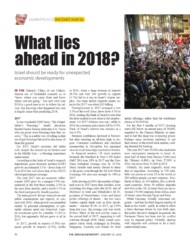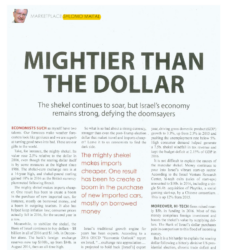Latest Insights
what lies ahead in 2018?
In this paper, Prof. Shlomo Mei-Tal reviews the important statistics and trends in the Israeli economy in 2017, and the forecasts for the changes that are expected to affect the economy in 2018
Opportunity for national civic service for Arabs
The fact that the Board of Arab Mayors started to discuss the establishment of Arab youth volunteering should be welcomed. Integration of Arabs in the National Civic Service would benefit everyone; however it should not be forced.
Mightier than the dollar
The shekel continues to soar, making exports more costly, but Israel’s economy remains strong, defying the doomsayers
ALIBABA! SABABA!
In this article, Prof. Shlomo Maital analyzes Israel’s influence on the entry of foreign companies that employ many high-tech workers, such as Alibaba and Amazon.
In this analysis, the economic effects on Israel are investigated (the ideas and skills of Israeli high-tech workers are sold to foreign companies, local high-tech
companies cannot compete with the salaries of international giants like Amazon), and the social effects (average salaries in these companies
affect wage gaps in Israel and consequently the social balance)
The importance of the academic colleges of engineering
The time has come to refresh the thinking and recognize the contribution of the colleges of engineering to a balanced academic system and the personal development of their graduates.
Saving TEVA
ISRAEL’S FLAGSHIP global giant, Teva Pharmaceuticals, is in deep trouble. Teva’s share price was cut in more than a half. The latest collapse was in part the result of a misguided $40 billion acquisition that left Teva with massive debt and the patent expiration of Copaxone, a drug for treating multiple sclerosis that, at its peak, brought Teva $4 billion in annual revenue and half of the company’s total profit. TEVA One of Israel’s largest companies was founded before the establishment of the State of Israel and its importance to Israel is great. Summary Ways to Save TEVA.
The importance of Haifa Chemicals
The workers of the chemical industry in Israel are the spearhead of a profitable and smart industry that contributes significantly to the economics of Israel. If the owners insist on closing the company, the government must ensure that the company will be transferred to industrialists who will agree to operate it and invest in the ammonia supply and production needs.
The Era of Gut Feelings in Management is Over
The data management revolution is a golden opportunity for the traditional industry in Israel to improve productivity by adopting innovative technologies and methods for managing and extracting data
Is Israel no longer drying up?
In this article published in The Marker, Prof. Ofira Ayalon criticizes the Israeli government for its lagging attitude towards water consumption in the State of Israel. Prof. Ofira Ayalon noted data pointing the possibility of a future shortage of water in Israel, and called on the Israeli government to raise public awareness of the water problem and to invest in finding technological solutions to this problem.
LET’S SAY HELLO
Intel’s $ 15 billion purchase of Mobileye could be the way to go for Israeli hi-tech bringing in jobs and expertise rather than taking away brains









